SEO Guides, Tips & More!
Learn from Our Experience
Keyword Research Essentials for Accounting Marketers
There is a misconception in accounting marketing circles that they need to hire a digital agency to manage their firm’s website and search engine optimization programs. While there are advantages to working with an outside agency, motivated and engaged accounting marketers can take their firm’s website a long way without ever spending a dime on a digital agency.
The vast number of videos, blogs, podcasts and tools available on the web make it easy to develop foundational knowledge for general SEO, local SEO and even pay-per-click (PPC) and paid advertising. The only thing most accounting marketers need is the time to learn and the desire to experiment and try new things on their websites. If you have an experimental nature or a strong interest in learning about these topics beyond a 30-minute presentation – you’re in luck.
In this blog post, we will review some of the more popular and useful keyword research tools (free and paid) available for accounting marketers.
Why are Keywords Important?
Prior to jumping into the list, it’s important to understand why keywords and keyword research are important to your digital marketing efforts. Google and other search engines have stated for years they ignore information provided in the meta keyword field, so why bother with keyword research?
Good question and I have a good answer!
A key difference between a website that gets a lot of traffic and one that gets very little traffic is the keyword focus. A firm with a well-targeted keyword strategy can draw in hundreds of qualified visitors per month, while a firm with poorly selected keywords may only attract a few qualified visitors during the same time period. Although search engines ignore the meta keyword field it doesn’t mean that keyword strategy and selection is not important. Keyword selection is likely one of the most important steps in SEO or PPC advertising. Ensuring that your content is found by the searcher means you want to appeal to them at the heart of keyword selection. For example, a core target for my company is accounting marketers. Did you notice the title of this blog post? Yes, that wasn’t an accident and hopefully, if you are reading this post then you are either an accountant, CPA, or accounting marketer.
Different Types of Keywords
There are different types of keywords that can be used in your keyword strategy including short tail keywords, long tail keywords and question-based keywords. Those sound more like different types of fish than keyword variants but stick with me.
- Short Tail Keywords – These are very broad terms that are designed to attract a wide audience to your site. An example would be “Denver CPA Firm”. There are many individuals and companies in Denver that need the assistance of a CPA Firm. Since the term is very broad it’s easier to rank for and attract a lot of traffic to your website. The downside is that not every CPA Firm in Denver wants to work with every individual or business in Denver that needs help. In other words, the inquiries generated through this keyword will be less qualified (depending on the type of work you want to target).
- Long Tail Keywords – This is a keyword term that is generally three or more words and uses very specific terms. An example would be “Tax Planning Tips for Denver Real Estate Companies”. While it’s clear this search is going to appeal to a much smaller group than a short tail term, the quality of any resulting opportunities will typically be much higher. These terms are generally more desirable because they eliminate any traffic that was not interested in your content or simply not a good fit for what you are attempting to accomplish.
- Question-Based Keywords – These are keyword terms that appear in the form of a question. An example would be, “what are effective tax planning tips I can follow?” These keywords have become more popular for two reasons. First, the proliferation of mobile devices has increased the number of voice searches being made and the way a person searches, when they must type versus when they speak, is very different. When someone uses voice search, they tend to speak in complete sentences and ask complete questions. So, optimizing for these terms increases your opportunity of being found. Second, Google has various search engine results page (SERP) features that highlight a website’s content and make it stand out. Below is an example of a featured snippet. Firms should aspire to capture these features (also known as Rank 0). The click-through rate (CTR) for this feature is upwards of 50% compared to an organic #1 ranking which has a CTR of 18%-20%. It’s easy to see why your firm would want to target these keywords assuming the questions are relevant to your target audience.
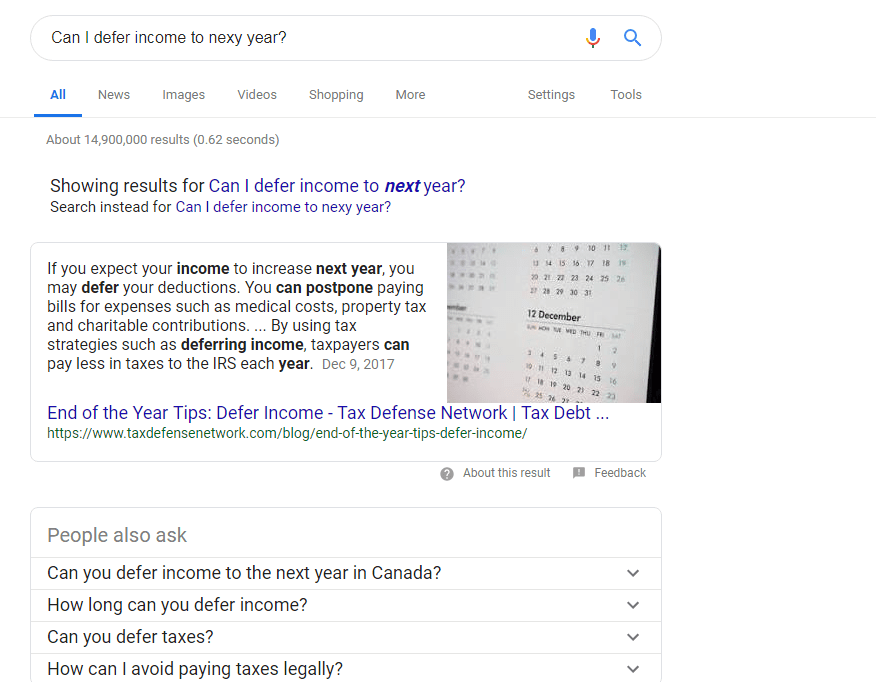
What about Keyword Difficulty?
One more important concept to understand before we get to the tools is keyword difficulty. This is a measure of how difficult it will be for a website to rank for a keyword term. Since there are likely going to be several terms that you can target, it’s important to pick the terms that are not too difficult to rank on. When you have several keywords, look at the difficulty score to understand where the low hanging fruit is for your site. Consider how many people are searching for the term, what other CPA and accounting firms are ranking for the term and what’s your level of competition.
It’s important to find the terms that your firm’s website can rank on. All the organic SEO tactics in the world will be wasted if your firm can’t rank on your selected keyword terms because of stiff competition. In many cases, it makes sense to go for the terms with less competition as it will be easier to rank on these terms and open the door to some wins for the site. Over time as the site gains credibility and enhances its SEO value, then consider going after the more competitive terms.
Keyword Research Tools
Now that you understand the basics about various keyword terms and keyword difficulty, it’s time to head out onto the web and look for tools that can help in your keyword search. Below are six of my favorite keyword search and suggestion tools that can help guide your efforts.
UberSuggest (free)
This is a free keyword research tool offered by Neil Patel who is well known in the SEO industry that provides quite a bit of valuable information. To get started, all you need to know is the seed keyword term you want to research. If you don’t have a seed term, consider starting with the name of the service/industry or other items where you want to conduct keyword research. Examples may include “401(k) audit”, “tax planning”, “succession planning” or “tax compliance”. If your firm offers business valuations, simply search the term and the site will give you information on how often the term is searched and a list of suggested keyword terms. This is where it gets interesting, because you can really dig into the data provided and identify the terms that make the most sense for your firm.
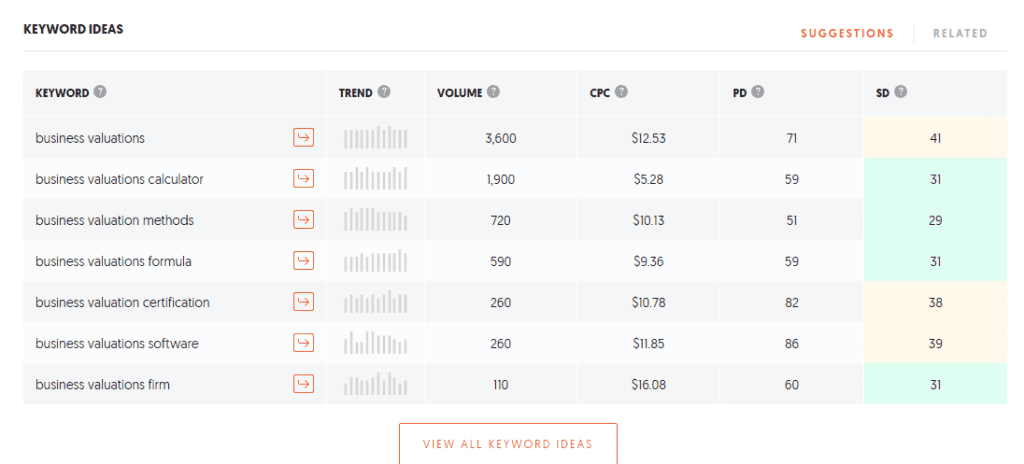
I also like this tool because it provides an analysis of the search engine result pages (SERPs) top ranking websites.
Why is this important? This allows you to understand the other on-page variables Google and other search engines look at when ranking a website. It also reveals where your firm’s site will need to be adjusted to be considered for a page 1 rank. Finally, you also get information about the estimated amount of traffic your website can receive by targeting the keyword.
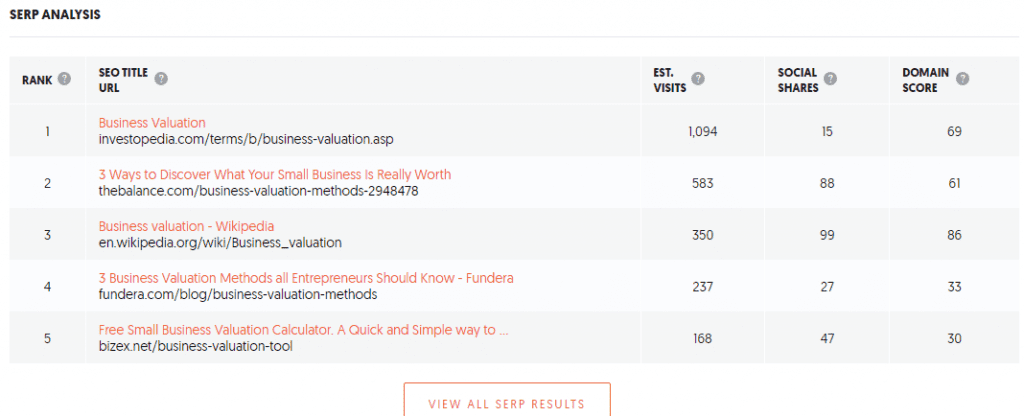
Answer the Public (free)
This free tool provides keyword suggestions related to and based on your initial search. Although the video of the gentleman on the homepage can be a little distracting, I really like this tool because of how it presents the results. Not only does it give you keyword terms related to the initial search, but it also provides long tail keyword terms using prefix terms including who, what, when, where, why and how. This is especially useful for accounting marketers looking to focus on a specific topic and go deep with their content marketing. It’s also useful if you are trying to target SERP features on Google such as featured snippets and related questions. While not all terms will be relevant (in some cases you may want to target users who don’t know what a business valuation is) it does open the door and spark creative thinking.
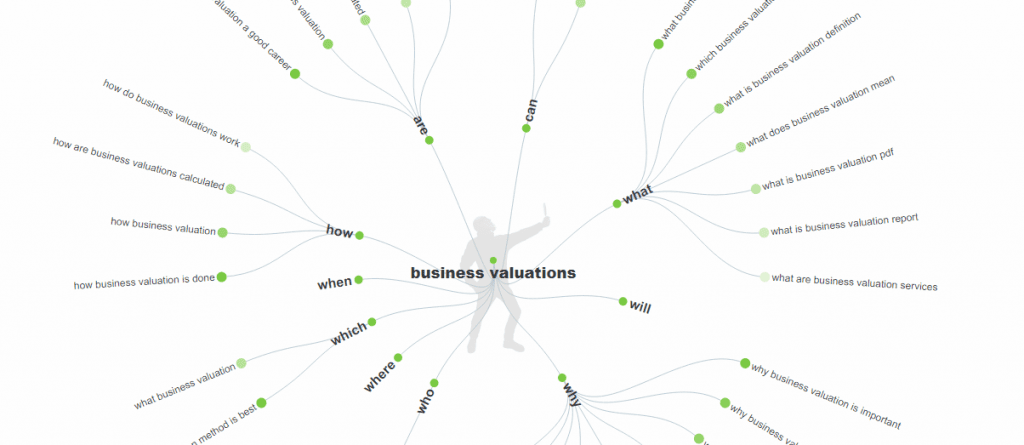
Another great feature of the tool is that you can see related keyword terms and even organize them alphabetically (for those who enjoy that). Finally, you can export the results to a comma, separated variable file (kind of like Excel) which allows you to conduct additional analysis or add information from other sources for your efforts.
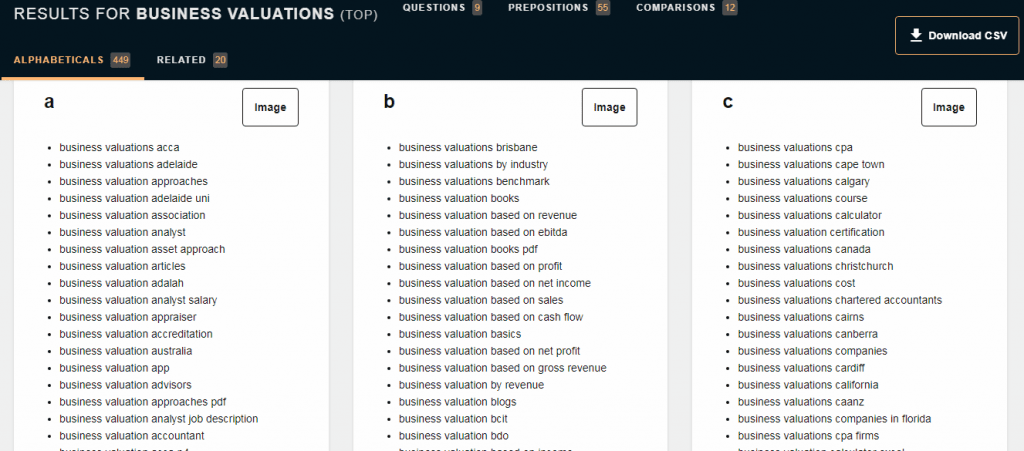
Keyword Tool.IO (paid)
This is another paid tool that has several free options that are very valuable. The tool allows you to identify popular keyword terms for Google, YouTube, Bing and a variety of other search engines. Less relevant to accounting marketers are the Amazon, eBay, and App Store keyword tools but certainly interesting none the less. If your firm is engaged on Instagram for recruiting purposes, you will be pleased to learn there is even a tool which identifies the best tags for the platform.

Another helpful feature offered by this tool is the ability to access keyword variations. There is a tab that provides question-based keyword terms and even prepositions. If your firm is present on various platforms, this tool is an all-in-one solution which will give you relevant keyword information for each targeted vertical.
The drawback to this tool is if you use only the free options, the data you get will be limited. It’s a case of pay-to-play, but even the free version will generate some great ideas for targeted keywords including blog post ideas for the future.

SE Ranking Research (paid)
This is another paid tool with some free options I have listed below. Like the other keyword research tools outlined in this post, you can enter a seed keyword term and get some great information back. Not only does this tool provide a list of keyword terms, it also provides a competition score. This is the level of difficulty you will encounter in trying to obtain a high ranking for the suggested keyword term. Difficulty reflects the number of other sites targeting the same term, domain authority, number of backlinks and other organic SEO variables. The more advanced or higher the score, the more difficult it will be to rank for the specific keyword term. Note I have stuck with “business valuations” as my keyword term throughout the post. Obviously, your term will vary based on the service you are trying to promote or the term you want to rank on.

What I really like about this tool: It will show you the paid activity for the same keyword term. This is awesome because it allows you the opportunity to see who is really focused on this term. If you are in a small market or are using a geographically centered term, you can see what potential competitors are spending to appear in SERPs.

It even has the option to select and view the ads competitors are running for the term. Here we see the firm Duff & Phelps is targeting the term and even examples of the various ads they are running. If you are looking to do some website analysis of your competitors, this is excellent information to have in your holster.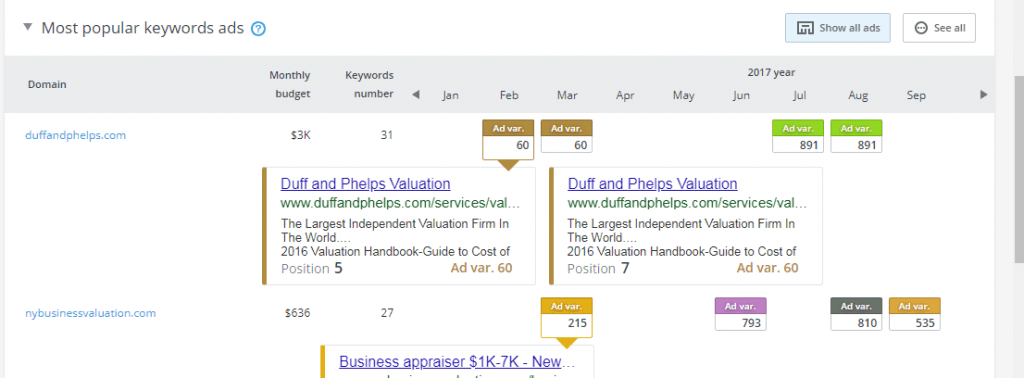
Google Search Console (free)
This is another free Google tool that gives very valuable information not available in other places. Rather than giving you ideas about terms you can target and possible rank, this tool will tell you the terms on which your site already ranks. This is important because if you are looking to increase the firm’s exposure for “business valuation” keyword terms, it makes more sense to work with terms the site is already ranking for (page 2 or 3 of organic results) rather than starting with terms where the site doesn’t rank at all. The image below shows the summary section giving insight into this firm’s overall total website impressions, clicks and click through rate (CTR).
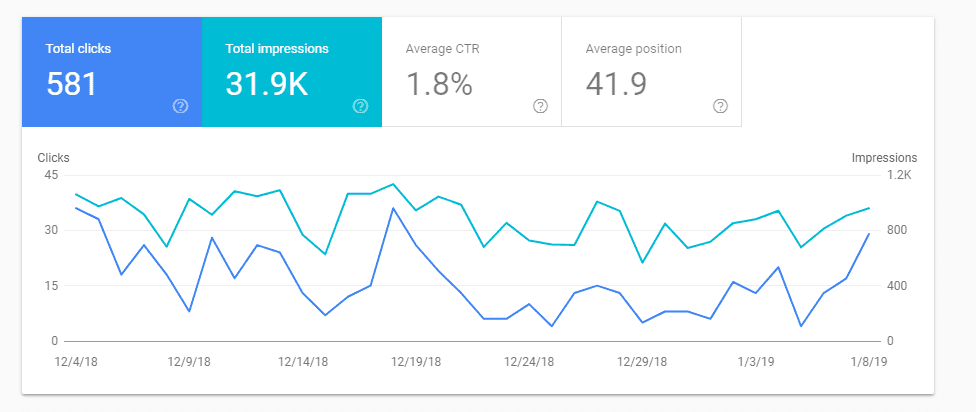
The screen below shows the actual keyword information. In this example, we see the firm appeared twice for the term “corporate consulting services” but attracted no clicks. This could be because the firm has never intentionally tried to target these terms or they may need to spend more time on SEO and content marketing to win more clicks. Whatever the case, I find this very interesting because once a site is already ranking for a term, a little time and attention can go a long way to make quick strides in keyword improvement.
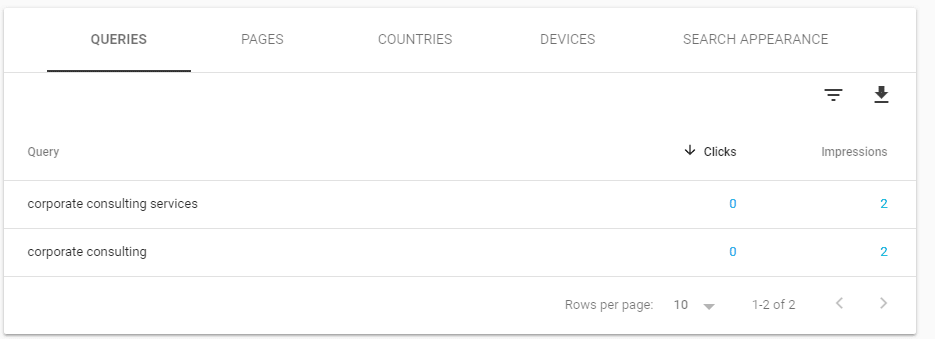
If you don’t have Google Search Console set up on your website, now is the time to do it. All you need to do is sign up for the free account and install tracking code. While there is a lot more information available on Google Search Console, this is the most important as it relates to keyword research and planning. Google is usually able to provide you with information within a few hours.
Google Trends (free)
This is a free tool offered by Google that provides information on how search trends for keywords are changing over time. This is important because every service a CPA or accounting firm offers has a natural buying cycle. To say it another way, there are times of the year when certain services are more in demand than others. Tax compliance would be one obvious example but there are literally dozens more. Beyond the trend analysis, it’s also useful because it allows you to compare the performance of various keyword terms to identify which variations will perform the best.
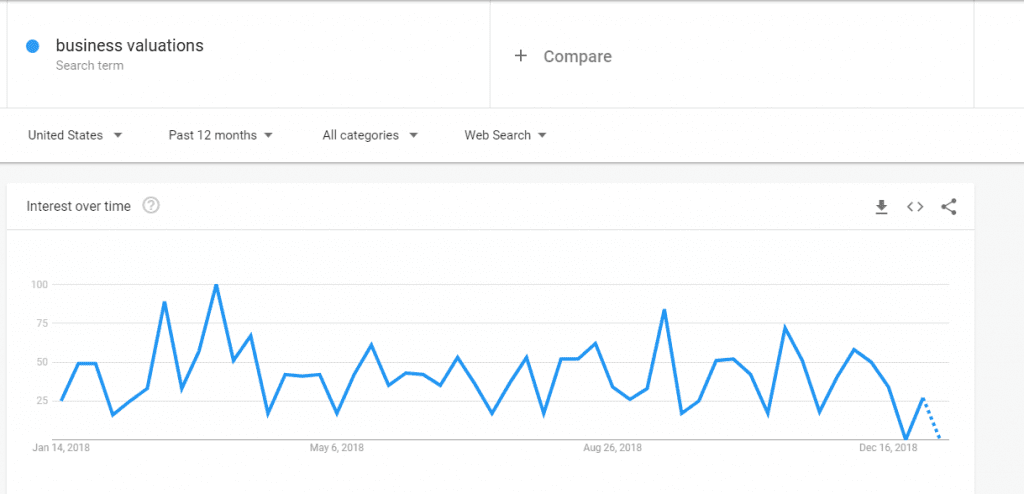
This is information that is not available in Google Analytics or Google Search Console and the reason why this tool is so valuable. Google Trends is very useful for accounting marketers who are looking for keyword suggestions or variations on a seed term.
Finally, if your firm is active on YouTube, you can check to see what keywords are performing there as well. With a click of the mouse, you can gain information on how well your keyword term is performing on YouTube. Note that keywords perform differently on Google than on YouTube.
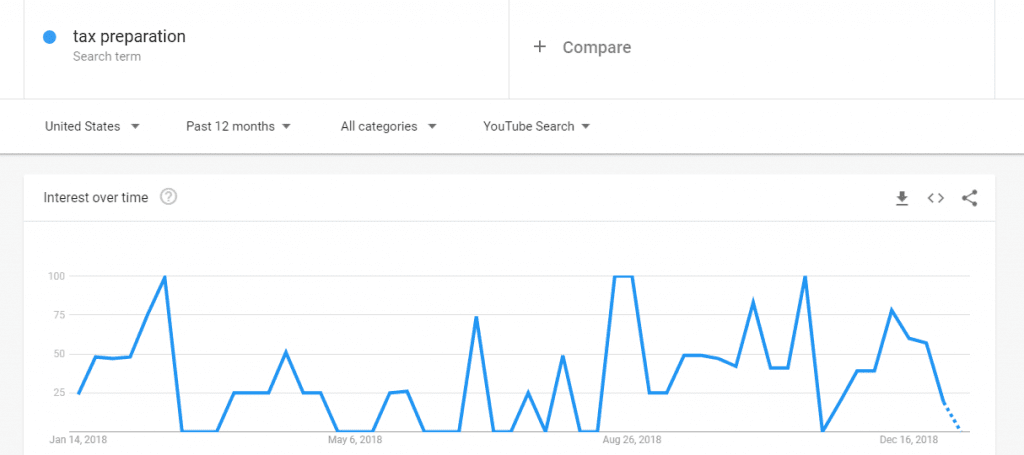
Paid v Free Keyword Tools
After reading this post some accounting marketers may be wondering if they should go with a paid tool highlighted above or stick with a free version. My recommendation is to stick with the free tools if you are just learning keyword research or are experimenting with it for the first time. Let’s face it there is no reason to work up an expense report for access to a tool you may not use over the long term. There are many amazing benefits and things you will learn simply by using the free tools.
If you have been working at it a while and are as skilled as accounting marketing professionals Eric Majchrzak, Katie Tolin or Sarah Cirelli, you may want to make the move to a paid tool that offers more features and functionality that can be used to analyze and identify all types of keyword terms and combinations. The amount of data available through the paid products does often exceed their free counterparts, but I only suggest making the investment if you are involved in both organic and paid marketing efforts, or you are certain access to such information will help increase the value delivered to the firm’s digital marketing programs.
Tackling Keyword Research
At the end of the day there really are a lot of tools available to accounting marketers to help identify keywords to target. Once you have selected your seed keywords, continue to track your progress month over month and don’t be afraid to vary the keywords you are targeting as one may lead to less than optimal conversions while another may knock your socks off. As the adage goes, “variety is the spice of life (and SEO)”. Okay I added the last part in for fun. As your site starts to climb and potentially overtake a competitor, you will start to feel what I call the “Google rush” which is the feeling of satisfaction that comes from a well-run SEO program.
So what’s a tool that works for you? What did you think of my analysis leave a comment below and let me know!

